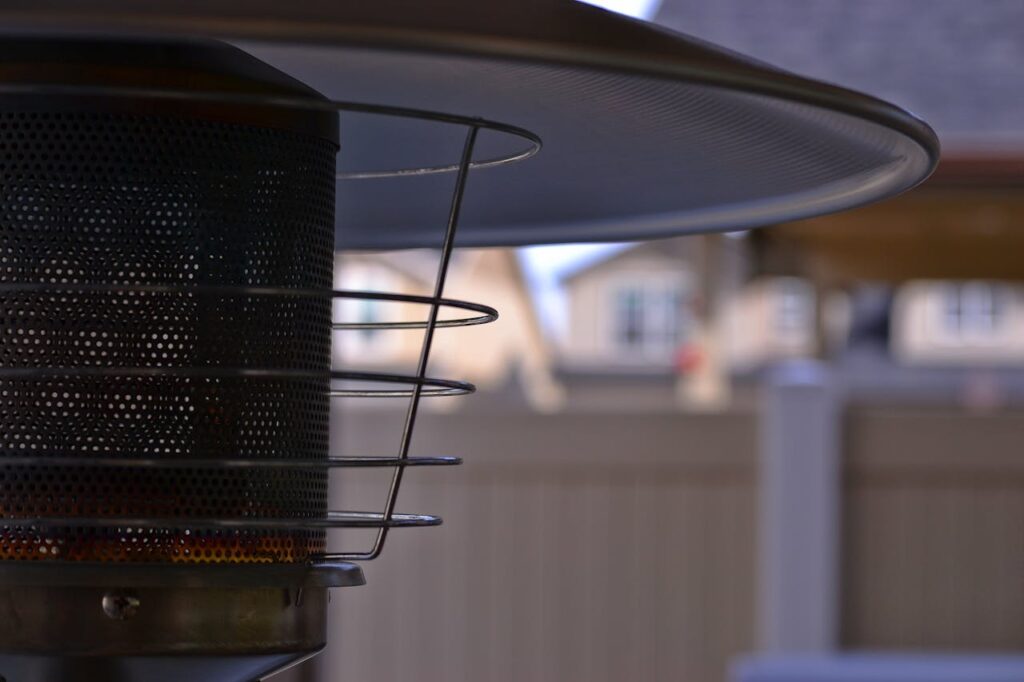As someone who has worked for many years as a technician repairing heaters and heating systems, I understand the importance of selecting the proper propane heater and using it safely. Propane heaters are cost-effective, portable, and formidable; however, with correct selection, installation, and use, they can do their job safely. Here’s a complete guide to help you decide how to choose the right propane heater for your needs.
How to Choose a Propane Heater
Choosing the best propane heater is about more than just pulling one off the rack. Here are the top things that I always tell my clients to keep in mind:
The right propane heater for you begins with knowing the space you need to heat. Step 1: Determine the BTU Output. The first step is to determine how much heat you need. This is a measure of the heat capacity of the heater. To find the BTU requirement, you need to multiply the Area of the premises for which the heating is intended by 10 (plus your desired temperature and 0.133). For instance, warming up a 500 sq. ft. space with a 30°F rise needs approximately 1,995 BTUs.
Then choose the type of heater:
- Forced Air Heaters : The best heating solution for large, open spaces such as construction sites or even a garage. They warm very fast because they have a fan and heat well within minutes.
- Radiant Heaters: Best suited for zoned heating, these heaters warm the objects and people in a room rather than the air, making them ideal for home workshops.
- Convection Heaters: Great for spot heating applications of small to medium size rooms, naturally circulates warm air, great for basements or insulated garage spaces.
Think about whether you want portable or fixed. Some models offer portability, so you can easily transfer them from room to room whenever necessary. Conversely, some units are designed to stay in one place, whether on countertops or tables, for heating a particular dedicated space.
Finally, focus on safety features like ODS or oxygen depletion sensors, tip over shut-offs, flame failure devices, and any overheat protection to prevent accidents here.
How to Prevent Carbon Monoxide Poisoning from a Propane Heater
Carbon monoxide (CO) is a silent killer—odorless, colorless, and deadly. Preventing CO poisoning is crucial:
Ensure adequate ventilation in any space using a propane heater. Even “indoor-safe” heaters require some airflow. Crack a window or door to facilitate air exchange.
Install carbon monoxide detectors near sleeping areas and in any room with a propane heater. Test these devices monthly and replace batteries regularly to ensure proper function.
Perform regular inspections of your heater. Check for blockages, damage, and ensure clean, efficient combustion.
Always use the correct heater for the space. Outdoor-only heaters should never be used indoors. Stick to indoor-rated models in enclosed areas.
Selecting the Right BTU for Your Propane Heater
Avoid Choosing the Wrong Temperature. The BTU rating is really important to heat correctly and safely:
The following formula can be used to determine BTUs needed.
BTU Needed = Area (sq. ft.) × Temp. Rise (Desired) (°F) × 0.133
Consider the following factors:
- Insulation Quality: If you have poor insulation, you may need a larger BTU heater.
- Climate – Condition: Heaters required for colder climates take more BTUs.
- How You Use It: You may need a higher BTU heat output for continuous heating, and a lower one for occasional use.
Don’t go either oversized or undersized on the heater. Over-sizing wastes fuel and incurs extra expense, while under-sizing results in inadequate heating.
Top 5 Best Outdoor Propane Heaters in Australia: Stay Warm in Style
Outdoor Propane Heater Running Cost
Average running cost for outdoor propane heaters in Australia. The average cost to run an outdoor propane heater in Australia will be influenced by its MJ/h rating and the price of LPG. An 8.5kg swap-and-go LPG cylinder is priced at $31.50 and comprises approximately 417MJ of energy. A 37MJ/h heater will, for instance, on a full cylinder last about 11 hours (417÷37 ≈11.3). Smaller 28MJ/h models should be able to extend that runtime out to about 15 hours.
Yes, LPG heaters can provide instant radiant heat where available and space permits, but with recent increases in gas prices, they’re no longer necessarily the most cost-effective option. At the time of this writing, on average, you should be looking between $2.00–$2.90 an hour working at current rates, according to efficiency and your LPG gas rate in your Area.
To save money, select an output adjustable heater, only use it when necessary, and place it so it does not lose heat through the wind. For regular use in a dedicated space, be sure to opt for a natural gas connection or a high-efficiency infrared model so you don’t rack up long-term costs.
How Long Does a 20lb Propane Tank Last for a Heater?
A typical 20lb propane tank will contain around 4.7 gallons, which amounts to 430,050 BTUs under ideal circumstances.
The runtime can be estimated using this equation:
Runtime (hours) = BTUs in Tank / Heater’s BTU Rating
A 20,000 BTU /hr heater would be able to run for about 21.5 hours (430,050 ÷ 20,000).
Remember! External factors, such as the ambient temperature, wind conditions, and heater efficiency, will affect actual Runtimes.
Propane Heater Maintenance Tips
Safety and Efficiency Rely on Regular Maintenance:
Have gas connections checked for leaks periodically by applying a soapy water solution to all fittings. Bubbles indicate a leak.
Keep internal components clean. Burners and pilots can become filled with dust and debris. Clean them with compressed air.
Look over hoses and regulators for any cracks, wear, or damage. Replace any compromised parts immediately.
Book yearly servicing by a professional so all parts are working smoothly and safely.
How to Clean a Propane Heater
Because cleaning your heater can help improve your safety and performance:
- Be sure to Turn Off and Cool Down: Never leave the heater running.
- Break her down: Slowly take out any piece she is designed to be pulled apart in the instructions.
- Clean Pilot Light and Burner: Dust off using a soft brush and compressed air.
- Wipe the Outside: Clean the exterior with a damp cloth.
- Re-Assemble and Test: Re-assemble the box, and make a test run to verify that it’s working.
Outdoor Propane Heater Safety Tips
Propane heaters are safe when used appropriately; however, misuse can result in fire hazards or carbon monoxide danger. Australian safety authorities, including Fire and Rescue NSW in Australia, say to only use heaters on stable and level surfaces away from flammable objects such as shade sails, furniture, or plants. Keep a minimum of one metre clearance around the unit. Do not bring an outdoor-rated propane heater indoors or into enclosed areas.
Before each use, inspect for gas leaks on all hoses and regulator fittings with a soapy water solution. Extinguish if bubbles appear, and repair the leak before using. Clean the burner and emitter screens to ensure that debris does not accumulate in a manner that creates uneven flames or flare-ups. Never leave the heater unattended while it’s on, and ensure that children and pets are kept at a safe distance, as well as storing LPG cylinders in an outdoor secure, well-ventilated spot. Have your heater serviced by a licensed gas fitter every two years to keep it in good working order.
Can You Use a Propane Heater in a Tent?
Not really, except with models that are made specifically to be put inside a tent.
Select a heater that has been safety certified for indoor/tent use and includes features such as an oxygen depletion sensor.
Vent: Ensure proper ventilation by leaving a vent or window cracked.
Never sleep with the heater on; always turn it off before going to bed.
How Do You Use Propane Heaters Safely Indoors
Safety considerations using indoor propane heaters:
Only choose indoor-rated models that have passed safety testing.
It’s also advisable to maintain consistent ventilation and avoid CO buildup.
Have CO detectors and smoke alarms installed nearby.
Do not position the appliance on or near grills, furnaces, fireplaces or other sources of heat.
How to Safely Use Propane Heaters Indoors
During this period of time, garages have their own risks and need to be monitored:
- Go with a garage-rated heater that has an automatic shut-off.
- We recommend leaving a window or garage partially open for ventilation.
- Do not let heaters be too close to anything flammable, such as gasoline or oil.
- Put a carbon monoxide detector in the garage, and check it regularly.
You will be able to enjoy the comfort and ease that comes with a propane heater safely by adhering to these simple suggestions. As a technician, it cannot be emphasized enough how essential proper selection, maintenance, and safe operation are. Stay warm and stay safe!
How to Safely Use a Propane Heater in a Garage
During this period of time, garages have their own risks and need to be monitored:
- Go with a garage-rated heater that has an automatic shut-off.
- We recommend leaving a window or garage partially open for ventilation.
- Do not let heaters be too close to anything flammable, such as gasoline or oil.
- Put a carbon monoxide detector in the garage, and check it regularly.
You will be able to enjoy the comfort and ease that comes with a propane heater safely by adhering to these simple suggestions. As a technician, it cannot be emphasized enough how essential proper selection, maintenance, and safe operation are. Stay warm and stay safe!
Outdoor Gas Heater Bunnings
When it comes to outdoor heaters in Australia, Bunnings is usually the first (and only) choice for anybody after a patio heater, both online and in-store. Unfortunately, the actual options are limited, as you will be looking at a few LPG and Natural Gas ones from the likes of Mimosa, Jumbuck, Heatstrip, and Enders. Some are so-designated for a certain type – the classic “mushroom” design, but also models such as those made to be sleek quartz tubes, and these can heat spaces from 10m² to over 17m², depending on which you’re using. Prices typically fall between roughly $179 for entry-level units and $849 for premium stainless steel or portable commercial-grade heaters.
When choosing a Bunnings gas heater, you should carefully consider factors like heat output (MJ/h), construction material, and safety features, including the type of tip-over shut-off switches, flame failure devices, and oxygen depletion sensors. If you’re after a statement piece that offers style and performance in one dramatic pack, the outdoor propane heater pyramid — or tall glass-tube flame heater — is both warm and a highly-spanning focal point for your patio or alfresco space.
Models such as the Havana Stainless Steel Pyramid Heater or Gasmate’s Deluxe Stainless Steel Pyramid Flame Heater provide powerful heat output across their range, push-button ignition, and finishes that are robust enough to blend in suitably with modern residential or commercial settings. Always follow the manufacturer’s clearance recommendations. To prevent heat damage to awnings or walls, outdoor gas patio heaters are not designed for use under awnings.
Outdoor Propane Heater FAQs
A standard 20 lb propane tank lasts 8–10 hours on high setting, depending on the model’s BTU output.
Yes, as long as used according to instructions. Look for safety features like anti-tip shutoff and oxygen depletion sensors.
Only certain models like the Mr. Heater Big Buddy are indoor-safe. Most patio heaters are for outdoor use only.
For patios, 40,000–48,000 BTUs is standard. For compact spaces, 10,000–20,000 BTUs is enough.
Dome-top heaters perform better in wind. Always place heaters in sheltered areas for optimal performance.

